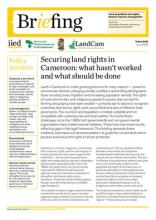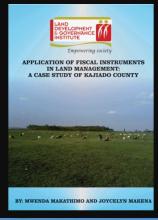/ library resources
Showing items 1 through 9 of 23.Land in Cameroon is under growing pressure for many reasons — powerful commercial interests, changing climate conditions and shifting demographic flows including mass migration and increasing population density.
This article reflects on the Tenure Guidelines as a tool for addressing resource governance challenges.
Fiscal instruments are tools that governments use to manage revenue and expenditure and therefore influence the growth (or stability) of the various sectors of the economy. Government revenue is derived primarily through taxation.
The acquisition of land by foreigners in developing countries has emerged as a key mechanism for foreign direct investment (FDI).
Land plays a vital and central role in the economic, social-cultural and political lives of both individuals and communities.
Land acquisitions, either driven by foreign investments or domestic investment needs have continued to polarize opinions.
Kenya is going through a period of intense transition. The country's main development policy, Vision 2030, is just entering the second Medium Term Plan of Implementation from 2013.
Kenya is currently implementing a number of large scale infrastructure and development projects aimed at trans forming the country into a newly industrializing, middle-income country.
The Land Act, 2012
The Land Registration Act, 2012
The National Land Commission Act, 2012
The Environment & Land Court Act, 2011
The Urban Areas & Cities Act, 2011
Pagination
Land Library Search
Through our robust search engine, you can search for any item of the over 73,000 highly curated resources in the Land Library.
If you would like to find an overview of what is possible, feel free to peruse the Search Guide.









